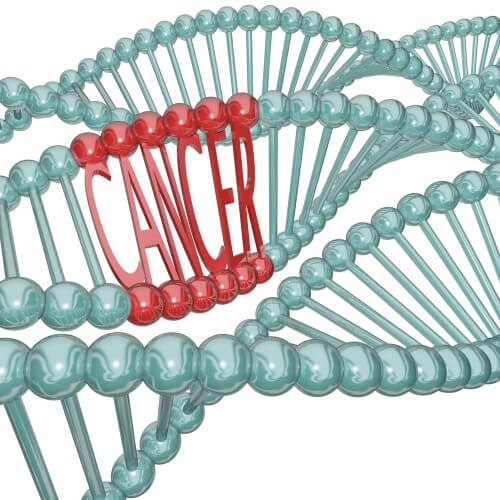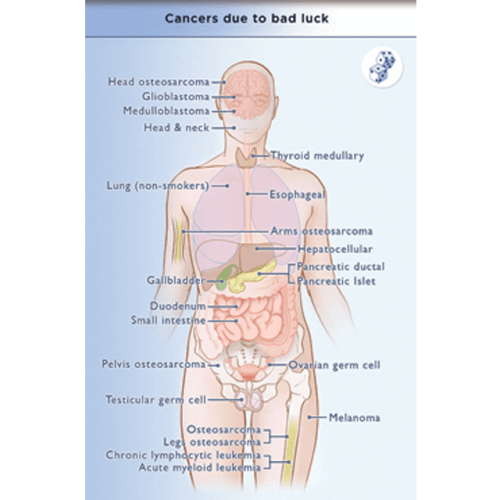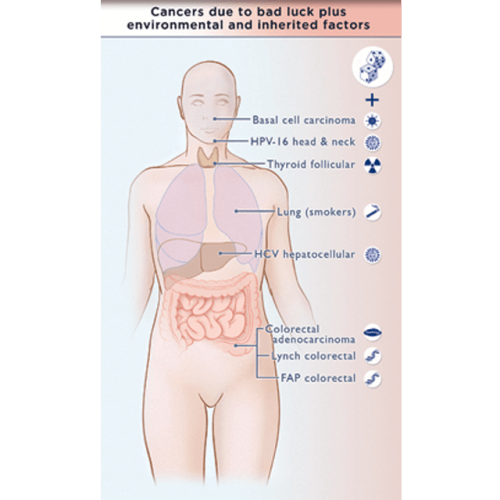This is according to a study published by researchers at Johns Hopkins University who examined the rate of division of adult stem cells in different types of tissues. As the stem cells in a tissue divide more times during a person's life, the chance of getting cancer in that tissue increases

A statistical model developed by researchers at Johns Hopkins University which measures the ratio between cancer cases in a variety of organs and tissues in the body showed that they are mainly caused by random mutations that occur when the stem cells rub off.
According to the research findings, two-thirds of cancer cases in adults, in almost all tissue types, can be explained by "bad luck", when these random mutations occur in a gene that may increase cancer incidence, while the remaining third is due to environmental factors (smoking, sun exposure) or inherited genes .
"All cancers are caused by a combination of bad luck, environment and heredity. Now we have created a model that helps to quantitatively estimate how much each of the three factors contributes to the development of cancer" says Dr. Brett Folgestin, professor of oncology at the Johns Hopkins University School of Medicine, co-director of the university's cancer center and researcher at the Howard Hughes Medical Institute.
"Those who have lived a long life without cancer despite being exposed to known carcinogenic risk factors such as tobacco claim that this happened due to "good genes", but the truth is that most of them were just lucky," says Fuglecitin, who added that bad lifestyle habits can add to the bad luck for developing cancer.
The implications of the model are wide ranging, from changing the perception of risk factors, to funding cancer research. "If two-thirds of cancers in many tissues are explained by random DNA mutations that occur when the stem cells divide, then the change in our lifestyle will help to a large extent to prevent some types of cancer but will not be effective in other cases" says Christian Thomastiff, biomathematician and professor of oncology at the School of Medicine of Johns Hopkins and the Bloomberg School of Public Health. "We must invest more efforts in finding ways to detect these types of cancer as early as possible in stages where it is still possible to cure" he added.
In a report about the statistical findings published on January 2 in the journal Science, Thomasti and Vogelstein write that they reached their conclusions by scanning the scientific literature in search of the cumulative number of divisions of stem cells in 31 tissue types during a person's lifetime. Stem cells are self-renewing and therefore they replace dead cells in a specific organ.
According to Fogelstein, it is well known that cancer cases are caused when stem cells specific to a certain tissue make random mistakes - or mutations, when one chemical signal in the DNA is replaced by another during the replication process during cell division. The more such mutations accumulate, the greater the risk that the cell will grow in an uncontrolled manner, a precursor to cancer. However, according to him, the actual contribution of these random errors to the development of cancer, compared to the contribution of environmental or hereditary factors, was unknown until now.
To calculate the risk of having these Achaean mutations, the Johns Hopkins scientists created a number of stem cell divisions in 31 tissues and compared the rate of these mutations with the risk of getting cancer in those tissues over a lifetime among US citizens. From this comparison, the two calculated that the correlation between cell divisions and the risk of cancer is 0.804 - meaning that there is a high correlation between more cell divisions and the risk of cancer.
"The study showed, in general, that the changes in the number of life cell divisions in different types of cells corresponds to a change in the frequency of cancer incidence in these tissues." says Vogelstein. An example of this is the colon tissue, which undergoes 4 times more stem cell divisions than the cells of the small intestine. At the same time, the incidence of colon cancer is much higher than that of small intestine cancer.
"It can be argued, of course, that the large intestine is more exposed to environmental factors than the small intestine, which increases the risk of acquired mutations," says Thomasti. However, the scientists showed that in mice the situation is the opposite, that is, in them the number of stem cell divisions in the large intestine is smaller than in the small intestine, and therefore in mice the incidence rate of colon cancer is lower than in small intestine cancer. According to them, this fact supports the key role of the number of cell divisions in the development of cancer. According to the statistical description, the two calculated to what extent the variation in the risk of different types of cancer can be attributed to the number of cell divisions, which is 0.804 squared or about 65%.
Finally, the two classified the types of cancer they studied into two groups. They statistically calculated which tissues were more likely to develop cancer due to more frequent cell division. They discovered that 22 types of cancer can be explained by the "bad luck" of random DNA mutations during cell division. The other nine types of cancer were more common than predicted due to "bad luck" alone and this difference is attributed to a combination of environmental and hereditary factors.
"We discovered that the types of cancer in which the actual risk is greater than expected based only on the mutations in the stem cells were the ones we expected, including lung cancer linked to cancer, skin cancer caused by increased exposure to the sun and types of cancer linked to hereditary symptoms"
"The study showed that the risk of getting cancer can be increased through smoking or other bad environmental factors. However, many types of cancer were created as a result of bad luck in the distribution of mutations in the genes that cause cancer, regardless of lifestyle and hereditary factors. The best way to reduce the incidence of cancer in these cases is through early detection when they can be cured through surgery" added Foglestin.
The scientists say that some types of cancer such as breast cancer and prostate cancer were not included in the study because the rate of stem cell division in these tissues could not be found in the scientific literature. They hope that other scientists will help refine the model by more accurately calculating the rate at which stem cells divide.



26 תגובות
Life
I thought religious people actually believed in free will.
I will try to explain what I think with an example. My car has a mechanism that turns off the engine when stopped. It doesn't always happen, and in many situations I have seen the engine continue to work. As if the car has a will of its own! I checked... it turns out that there are many conditions for activating the mechanism, such as - temperature of the engine, temperature in the driver's cabin and the state of the climate control, seat belt, the state of the gear and the angle of the steering wheel. Now everything is clear :). In this case everything is deterministic.
In other cases, there may also be a "random" component - for example the weather.
Why the quotation marks? Because randomness is almost always lack of knowledge. Think of a fair toss of a coin - if we know all the data at the time of the toss then we can calculate the result.
I hope the explanation is clearer now.
Miracles
By chance I entered the article and at the end of your answer you say "I think free will does not exist". the article and
I haven't read the answers but such an answer is suitable for a religious person and from what I know you are not a religious person, unless you have a fatalist soul.
Maya
This is usually in the context of "free will". I believe that our choice is either deterministic or random, and that there is no third case. I mean - I think there is no free will...
Deterministic definitely doesn't mean knowable, but it is more promising than random (ie, the only limitations are knowing all the data and computing power. Both are pretty serious limitations but there's no way to know if they can be overcome or not).
You have already brought up the matter of the decomposition of the carbon before. I'm not an expert on the subject, but even in my understanding this process is completely random. It just made me laugh that you said something about randomness in mutations when you're flying the no-randomness flag. that's it.
Maya
Let's assume that what causes the mutation is a cosmic particle hit. So if I know where all the particles are and what their trajectory is, and where each cell of each person is... then I could tell you with certainty who will get sick, and when.
Now - is everything deterministic? I do not know. Let's take the decay of a single atom of C14. Is this breakup really random?
And one more point - does deterministic mean knowable? If the world is continuous, then probably his. Even the orbit of the moon cannot be precisely calculated.
Miracles,
I thought you didn't believe in randomness. Didn't you say that everything is deterministic?
Shmulik
interesting. I think the problem is that it is unpleasant to hear that there is so much randomness in it. Without realizing it, my feeling is that there really is randomness in it.
Miracles, David
Response from the World Health Organization:
http://www.haaretz.co.il/news/health/1.2542115
Another column on the subject:
http://www.haaretz.co.il/gallery/recipes/vegetarian/.premium-1.2545312
Uncle
The article says in detail what the effect of the environment is. What you are saying is that the article is wrong. Why?
To my understanding, without having read the article, a detailed statistical analysis was conducted on tissues (biopsies) from cancer patients, and it was found that a significant percentage of the mutations are of accidental origin (random mutations). Suppose this finding is accurate and correct, as one would expect from one of the greatest cancer researchers (Vogelstein), did he conclude that the influence of the environment is less important? No. Why? Because the development of cancer is often associated with a decrease in the efficiency of the immune system, which is certainly influenced by the environment. In other words, the difference between a person with a certain set of mutations, who developed cancer, and another person with the same set of mutations, who did not develop cancer, may be strongly influenced by environment and behavior
D.
Have you heard of that? http://en.wikipedia.org/wiki/Poe%27s_law
There are enough authentic psycho commenters here that it's hard to tell the difference
Yossi Simon
Albanzo said there were 10 holding atoms in the cell. We do not know how to accurately solve a problem of a total of 3 particles with a single force, even assuming that Newton's laws are correct...
Yossi Simon,
The facts you stated are not wrong, but the approach is problematic. Without going into technical details such as the correctness of Newton's law, one should remember that a human cell has something like 10 to the 14th power of atoms. That is, 1 with 14 zeros, and each atom is of course a complex system in itself. I hope it is clear to you that even with the most powerful computers, we have no ability to come close to solving such a number of equations that accurately (or approximately accurately) describe the individual particles. But that doesn't mean we don't know anything about the physics of such systems. There is a whole field in physics called statistical mechanics, and it deals excellently with descriptions of systems like we have described.
I mean, you can't really do what you suggested. But such problems can be handled with the tools of statistical mechanics and chemistry, and this is exactly what is done (as far as I understand, I'm really not from the field).
just a minute!
I would like to comment not as an expert.
As we all know and are present:
1. The world (or rather the universe) consists of atoms and atomic particles (we will call bodies) in addition there are several types of gravitational forces (perhaps it is like one brother waiting for a genius to decipher them) and fields that are part of the gravitational forces or another being
2. Twenty-one of the bodies are in constant motion.
3. If forces act on the body, the body changes its motion according to the general force vector acting on it.
4. The living/plant body, although it is composed in a wonderful and consistent way, it is still composed of bodies whose movement is ultimately subject to the laws of movement.
Therefore, if a certain cell does not divide as expected, this indicates that an unknown factor still "disrupted" the force vector at one time. Therefore, a disrupted mutation occurred and it is not random.
In my humble opinion, the emphasis should be placed and researched at a subatomic level the graph of forces, especially in the fraction of time that the disruption took place.
am I wrong?
D.
No one needs to know you're joking (or repeating yourself). There are enough commenters here who believe nonsense
Like on a lonely island where dinosaurs still swarm, evolution has not arrived here:- there are commenters here who do not recognize irony even when it is slapped in their face.
Maybe this site is really suitable for its readers and I have no choice but to apologize to the editor.
D.
Friendly suggestion, take to astrology and wrap fish with it. When talking about Aquarius I think of a sponge. Much more practical.
Hello father
If random mutations play an important role in most types of cancer,
Why does a certain type of rat have no cancer of any kind at all. ?
It seems to me that this data on the immunity of the rat to cancer was published here on the website.
D.
I know of no connection between the month of birth and the probability of getting cancer. I know a man who is willing to give you a million dollars if you show it differently (seriously). Don't forget that Cancer falls in the opposite season in the southern hemisphere...
To the editor of "Hidan":
Do you know if the sign of Cancer does cause cancer, and if it is because of the much exposure to the sun's rays in this sign?
I am sure that the answer will be of interest to many and will be in line with the rationality and skepticism that characterize the site, and are reflected in the title given to the (still existing) unexplained and seemingly random phenomena.
The question is, what causes the mutations. As an ultra-Orthodox Haifa resident, who is aware of the high incidence of cancer in the region, I ask if there are more influencing environmental factors beyond smoking and sun exposure? To classify a factor as "bad luck" is to say "I don't know" or "we didn't research enough".
Joseph
Only one third known, two thirds unknown... I'm just refining even more 🙂
You present an alternative approach. Everything is a result of environment and heredity. We simply do not understand 30%.
they claim. If we take a homogeneous population, of people with genetic and environmental diversity, and put them in a room. Random mutations will occur seemingly independently of candidates. This is an important refinement.
The statement that these are random mutations that depend on luck is not relevant, it is a surrender of modern science to its inability to do everything and immediately. Wait a bit and the explanation will come.
Brett Vogelstein is an award-winning professor of life sciences. As for the second one, I did not check. The ability to notice from piles of studies, to verify his hypothesis, that what is not done has no absolute protection, as well as to develop a quasi-mathematical model, for predicting the relative rate. It is not clear to me how the model works because I do not have the article. Maybe it's a data mining based model. It is also a demonstration of how important research in medicine is based on data mining. Using other people's results to get new results.
The article became a hit among both experts and the masses from the moment of its publication. Aren't what they call random mutations actually additional processes on top of the ones we know that are unknown to us? After all, in the study of signal and noise we call noise to everything that we do not understand deterministically. Also noise by the way can be understood statistically and that's what they did. The article cannot be downloaded for free. More precisely, I tried to locate. Perhaps one of the authors is in the list of Dr. Vogelstein's publications.